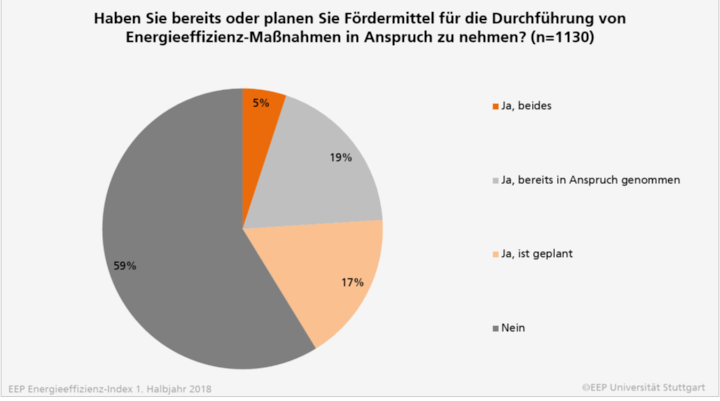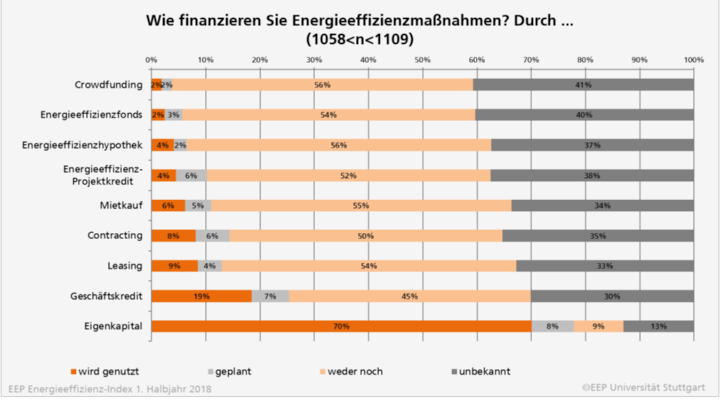By summer 2018 the Energy Efficiency Index EEI had recovered slightly. Practically all of the over 1000 companies taking part spoke out in favor of closing the trade deficit in order to achieve the energy and climate goals for 2020. The Institute for Energy Efficiency in Production (EEP) at the University of Stuttgart has been conducting surveys every half year since 2013 on current and planned activities of the German industry in terms of energy efficiency. The EEI is prepared in cooperation with the German Energy Agency (dena), the Federal Association of German Industry (BDI), Fraunhofer IPA and TÜV Rheinland.
The significance of energy efficiency remains unwaveringly high for companies, the planned investments are on the rise and the index value of the expected energy productivity is again considerably higher after it had recently decreased greatly within half a year at the turn of the year 2017/18.
“The mood in the companies seems to have taken a turn for the better for companies in terms of energy efficiency. The companies also seem to be willing to take measures such as the burden of energy sources on the basis of the CO2 intensity as well as expanding the emissions trading in order to achieve the climate goals“, according to the Head of the Institute for Energy Efficiency in Production (EEP) in Stuttgart.
1130 companies from 20 sectors also answered the special EEI questions, changing every half a year. Almost all companies questioned want to contribute towards achieving the energy and climate goals for 2020. Along with incentives they also welcome regulatory measures and would accept an increase in taxes or levies for this.
Only every third company has made use of the funds provided up to now to increase energy efficiency. The smaller the company, the less likely this is. According to the index survey the reason is very often the complicated application process.
Investments are therefore mostly made from our resources. 70% of those questioned state they use equity capital, 17% take out a loan. “Alternative methods of financing are largely unknown and are practically not used“, according to EEP boss Mr. Sauer, “The message doesn’t really seem to have arrived here yet“. Yet there is a diverse range of possibilities, such as, for example, crowd funding, the energy efficiency fund, the energy efficiency loan, among others.
“A conclusion from the current EEI survey states: the German companies are willing to commit to energy efficiency and the climate. Our recommendation: politics should now quickly ensure that the funds not availed can be used non-bureaucratically”, according to Professor Sauer.
Expert Contact:
Christian Schneider M.Sc., Project Manager Energy Efficiency Index, EEP – University of Stuttgartt, Nobelstr. 12, 70569 Stuttgart, email, phone +49 711-970 3640
Contact

Birgit Spaeth
Dr. phil.Public Relations



![Image 1: In your opinion with which measures should the existing trade deficit be closed for the energy and climate goals 2020) (n=1073, n‘=2412 [multiple answer was possible])](https://www.uni-stuttgart.de/universitaet/aktuelles/img-presseinfo/062_18_pm_energieeffizienz_index_Bild_1_Handlungsluecke.png?__scale=w:720,h:401,cx:0,cy:0,cw:1350,ch:751)

